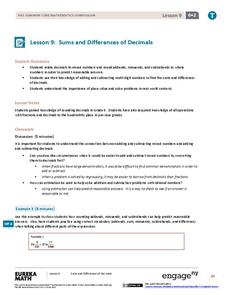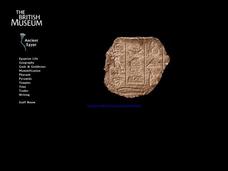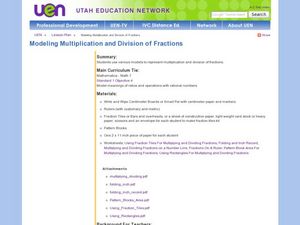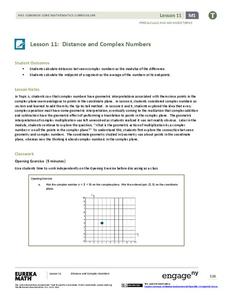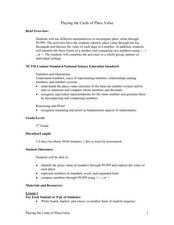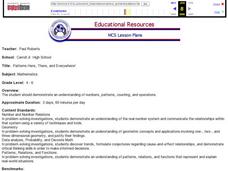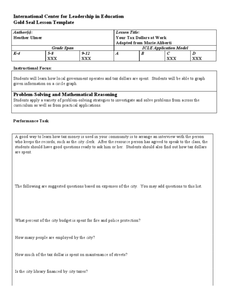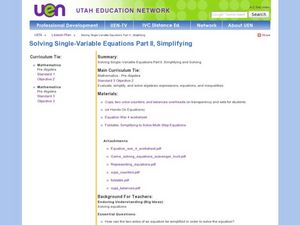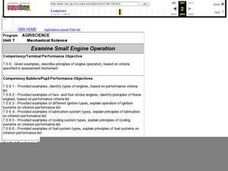EngageNY
Sums and Differences of Decimals
Sometimes dealing with decimals is so much easier than dealing with fractions. The ninth lesson in a 21-part module has the class consider situations when it might be easier to add or subtract fractions by first converting to...
Illustrative Mathematics
Reasoning about Multiplication and Division and Place Value, Part 2
The learner puts reasoning and estimation to work. The directions are to place a decimal in the answer to make the equation true. Pupils are to look at the two problems, one multiplication and one division, and estimate an answer. No...
Curated OER
Modeling Multiplication and Division of Fractions
Create models to demonstrate multiplication and division of fractions. Using fraction tiles to model fractions, pupils explore fractions on a ruler and use pattern blocks to multiply and divide. They also create number lines with fractions.
EngageNY
Distance and Complex Numbers 1
To work through the complexity of coordinate geometry pupils make the connection between the coordinate plane and the complex plane as they plot complex numbers in the 11th part of a series of 32. Making the connection between the two...
Curated OER
Playing the Cards of Place Value
Third graders explore place value to the ten-thousands place. In this amazing, 21-page place value lesson, learners represent numbers in standard and expanded form, and use technology to represent numbers to 9,999.
Curated OER
Patterns Here, There and Everywhere
Pattern recognition is a skill often used in mathematics. Learners count and sort manipulatives, organize the data into a graph and answer questions about the information displayed. They collect the objects to be used and create patterns...
Shodor Education Foundation
Graphing and the Coordinate Plane
Ready to introduce your class to the coordinate plane? This website includes a detailed lesson plan that includes two interactive games to help learners practice graphing ordered pairs. The scripted discussion is a little cheesy and a...
Curated OER
Properties of Equality
What assumptions are made in order to solve equations? An instructional slideshow provides an overview and guided examples of how properties of equality can be used to justify each step in solving equations.
Curated OER
The Fibonacci Sequence
Students investigate a numerical pattern and look for evidence of mathematical patterns in nature. They solve puzzles and work with a partner to predict sequential numbers in a series.
Curated OER
Your Tax Dollars at Work
In order to understand how tax dollars are spent, young economists use given data and graph it on a circle graph. Circle graphs are highly visual and can help individuals describe data. A class discussion follows the initial activity.
Curated OER
No Foot, No Horse
Why do horses wear shoes? Why do people wear shoes? Using worksheets, which are embedded in the plan, learners write descriptive paragraphs about their own shoes, classify a pile of shoes, and also engage in math games about the variety...
Curated OER
Solving Single-Variable Equations Part II, Simplifying
Seventh graders explore the concept of solving single-variable equations. In this solving single-variable equations lesson, 7th graders discuss how to simplify both sides of an equation. Students discuss using parenthesis and the...
Curated OER
How to Apply Properties in Multiplication
Students study the commutative and associative properties. In this multiplication lesson, students review the properties and solve several multiplication problems.
Curated OER
Fraction Models
Third graders make models of fractions and mixed numbers. Using fraction strips and drawing pictures, 3rd graders develop conceptual understanding of the equivalent forms. Students use the number line to represent and compare...
Curated OER
Ordinal Positions in a Sequence
Students study ordinal positions through class reading and discussion, complete an Animal Parade activity sheet and Internet activity to demonstrate knowledge about ordinal positions with 100% accuracy, and play a math computer game.
Curated OER
Mechanical Science - Small Engine Operation
Students experiment with two- and four-stroke engines. They conduct experiments to determine how atmospheric pressure affects the engine's running capability. Further tests are conducted to asses proper llubrication and its affects on...
Curated OER
Graphing and the Coordinate Plane
Students gain practice reading coordinates and plotting points by participating in the Coordinates! Game. They demonstrate and test their skills with graph paper and the Maze Game.
Curated OER
Super Sort
Students sort objects based on one characteristic. They define the term "attribute" and give examples of attributes of objects. Students explain their reasoning for sorting objects into groups.
Curated OER
Mathematical Properties for Addition
In this math worksheet, students read about and learn the properties of addition. Students study the commutative, associative, identity and inverse properties. There are no problems on this page for students to solve.
Curated OER
The New Texas Two-Step
Sixth graders work with mathematical expressions by interpreting, analyzing and problem solving with them. In this two step algebraic problem solving lesson, 6th graders use algebra tiles to solve equations.
Curated OER
Matrix Operations
Students solve problems using matrices. In this algebra lesson, students add, subtract and multiply matrices. They use the graphing calculator to simplify and graph linear equations.
Achieve
BMI Calculations
Obesity is a worldwide concern. Using survey results, learners compare local BMI statistics to celebrity BMI statistics. Scholars create box plots of the data, make observations about the shape and spread of the data, and examine the...
Noyce Foundation
Granny’s Balloon Trip
Take flight with a fun activity focused on graphing data on a coordinate plane. As learners study the data for Granny's hot-air balloon trip, including the time of day and the distance of the balloon from the ground, they practice...
Noyce Foundation
Cereal
Find the best protein-packed cereal. The short assessment task covers equivalent and comparing ratios within a context. Pupils determine the cereal with the highest ratio of protein. A rubric helps teachers with point allotments for...


